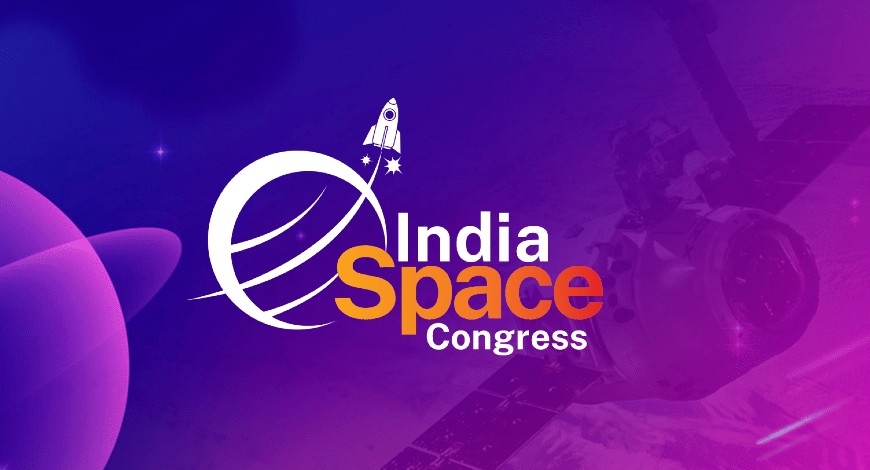BCS Stories
ISC 2022 brings together stakeholders from space agencies

A three-day event, India Space Congress in New Delhi from October 26 to 28, 2022 brought together speakers from 30 countries. The theme of the conference was ‘Leveraging Space to Power Next-Gen Communication & Businesses’. It was organised by SatCom Industry Association (SIAIndia) and supported by the Indian Space Research Organisation (ISRO), Ministry of Defence, NITI Aayog, In-Space, NewSpace India Ltd (NSIL) and the Department of Telecommunications.
Addressing the inaugural session, K Rajaraman, Chairman, DCC & Secretary, Department of Telecommunications, Government of India said that new technologies offer convergence and space communications can help in fulfilling key Government schemes like financial inclusion. He further said that space technologies can put spectrum to better use. DoT is working toward digital inclusion and the aim is to cover around 30,000 villages in the next one year. He further said that digital technology along with the trinity of Jan Dhan, Aadhar and mobile connectivity (JAM) had given the desired results, especially during COVID-19 pandemic.
Dr S Somanath, Chairman, Space Commission and Secretary, Department of Space and Chairman ISRO said that demonstrating capabilities to increase business opportunities will help create a larger space economy. A conducive policy for the sector is slated to be announced in the near future. Dr. Somanath further said, “Solutions provided by ISRO will help monetise the space economy. We have to start looking at our space sector with a whole new perspective to a larger and more monetised economy. If we look at NavIC, though a regional satellite navigation system, it has the potential of becoming a global navigation system.”
The inaugural session concluded with an MoU being signed between Taiwan Space Industry Development Association [TSIDA] and SatCom Industry Association of India (SIA-India). The MoU entails collaboration between the two industry associations focusing on the growth of the space industry and working towards a collaborative work atmosphere. The MoU was signed by the Representative of Taiwan to India, H.E. Baushuan Ger, and Dr. Subba Rao Pavuluri, President SIA-India.
With a view to nurture the growing interest of deep space tech startups in India, ISC 2022 announced a number of initiatives to showcase excellence by engaging with ‘iDEX 75 Space Challenges’ which was announced by Prime Minister during the Defence Expo, partnering with Microsoft to extend Founders Hub benefits to the 15 shortlisted startups. As part of the Founders hub program, 15 selected startups may apply to Founders Hub and avail up to $150,000 worth of free Azure credits.
Space technology startups are being forced to limit their sky-high ambitions, as their venture-capital backers turn to safer bets due to the current economic turmoil.
Decades-high inflation, rapidly rising interest rates and the Ukraine war have roiled global financial markets, forcing investors to evaluate their investment strategies and focus on companies with viable products in the market.
Investments in space technology companies, which collect, process and analyze space-related data, have fallen 80% in the third quarter to about $1 billion from nearly $5 billion in the year-earlier period.
“Venture Capitalists are refocusing on enterprise software-as-a-service companies and away from deep tech companies that provide solutions based on engineering innovation,” said a recently released report by New York-based Space Capital.
VC investment volume in space companies fell 44%, compared with a broader market decline of 31%, it added.
VC firms “are looking to reduce their exposure to capital intensive companies with low or long-term profitability models,” said Space Capital’s managing partner, Chad Anderson. “This is why space’s infrastructure layer will be the hardest hit during the economic downturn.”
The downbeat sentiment has also hit publicly traded “new space” companies such as Rocket Lab USA, Astra Space, Spire Global and Satellogic Inc, whose shares have fallen between 49% and 92%.
Many investors who explored aerospace last year have backed away, said William Kowalski, co-founder of Atomos Space, which makes spacecraft that help satellites maneuver in space. “Fundraising has been challenging, but it has allowed more capital efficient companies to stand out,” he said.
The startups pitched their ideas to industry leaders and investors at the session ‘Pitch Right for Skyrocketing Start-ups’ at the India Space Congress. The startups presented innovative ideas to the jury which included venture capitalists and investors. The startups will be mentored by iDEX, DRDO, Microsoft, Aniara Space and Bharucha Partners, among others.
The 5 startups that were selected are Astrogate Labs, Blue Sky Analytics, Vellon Space, Delta-V Robotics and Genex Space. Astrogate Labs is working on inter satellite laser link while Blue Sky Labs is into crunching satellite data to provide insightful data on climate intelligence. Vellon Space is into launch platform for customers to space and non-space. Delta-V Robotics is into software-based twin satellite programme and Genex Space has created an aerospace education hub for space education.
The jury members included Vinod Kumar of IN-SPACe, Vivek Virmani, CEO-iDEX, Benjamin Zeituon of Starburst Ventures, Rahul Seth of Antler and Raghu Das of E2MC.
The event, held for the first time successfully brought the high-level stakeholders together from space agencies, industry and institutions around the world under one roof to swap insights, strategies and rising trends for collaborative development of the space ecosystem in India and to bring global and regional economic benefits.





